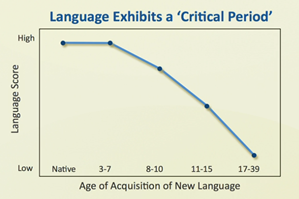
Penny Ur’s session at the IATEFL 2023 conference was on Interesting recent research. It is, in my opinion, a good example of the poor quality of information that those responsible for teacher education provide the profession. Leo Selivan gave a full review of the session, and I rely on his report here.

Selivan says:
After defining what is meant by recent (the last 5-10 years) and what is considered interesting (what she personally finds interesting), in what followed Penny Ur bombarded the audience with highlights of no less than 30 research studies – all in under 25 minutes!
The studies she presented were divided into six strands:
- Age and language learning
- L1 in the language classroom
- Oral corrective feedback
- Inferencing meaning from context
- The flipped classroom
- The use of pictures
I’ll concentrate here on age and language learning. In a second post, I’ll discuss Ur’s hopeless attempts to inform teachers about the other strands.

Age and language learning
The popular belief that children are better foreign language learners has prompted educational policy makers around the world to advocate for an earlier start of foreign language instruction. However, Ur cites Carmen Muñoz’s (2006, therefore not “recent” by Ur’s own definition) Barcelona Age Effect (BAF) project which showed that in the foreign language classrooms of Barcelona’s primary and secondary schools, “age did not afford the same advantages as it does in a naturalistic language learning setting. Contrariwise, older learners (teenagers) may fare better”.
Ur also cites a review of research on the age factor by Muñoz and Singleton (2010, ditto) which argued that other factors contributing to learner success, including motivation, attitudes, affiliation with the L2 and the amount of exposure and quality of input have been largely ignored. Selivan summarises Ur as follows: “The kind of learning child learners are better at – implicit learning – requires vast amounts of exposure. Unfortunately, in a school setting with a couple of classes a week, exposure is woefully insufficient making it difficult for children to leverage implicit learning mechanisms”.
Finally, Ur cites Lightbrown and Spada’s (2020) paper which concludes that “studies in schools settings around the world have failed to find long-term advantages [ultimate attainment] for an early start …..”.
That’s all Ur had to say.

Discussion
What, I wonder, did the audience make of Ur’s treatment of this important issue? The point she hurriedly made was that research findings question the wisdom of educational policy makers who advocate for an earlier start of foreign language instruction. Not surprisingly, given her attempt to get into the Guiness Book of Records for the most research covered in a 25-minute talk, she neglected to attempt any critical evaluation of the cited research. So she neglected to say anything about what the participants in Muñoz’s study were taught.

Muñoz herself says little about the syllabus and teaching methods used in the English courses she reports on in her articles on the BAF project, and you have to read her book to find out that the courses in question were based on synthetic syllabuses which involve treating the target language as an object of study. The teachers involved in the BAF often had a low proficiency in oral communication, they talked for 70%+ of classroom time, frequently in their L1, and the students had few opportunities to use the target language, to engage in communicative tasks, to learn by doing. Thus, students were taught about the target language far more than they were helped to use it and the tests measured what they knew about the language more than how well they could use it for spontaneous communication. Given all this, it’s hardly surprising that the older students learned what they were taught faster and better than the young ones, because, as Carmen herself indicates, young children rely on implicit learning which leads to procedural knowledge and consequent communicative competence, while older students are more receptive to explicit learning which leads to far less useful declarative knowledge.

So “earlier is better” as an educational policy is only mistaken if ELT is based on the sort of ELT you find in Catalan public schools, which is probably a representative model of how it’s taught just about everywhere. Older children are better than younger children at learning about the language, which is not, in my opinion, what – or how – they should be taught.
The still controversial “Critical Period Hypothesis” (which these days is explored in terms of “sensitive periods”) needs explaining to teachers, and its implications for ELT need attention. Teachers need to be involved in discussions about the research which suggests that young children learn additional languages in the same way that they learn their native language or languages: they make sense of the formal aspects of the additional target language for themselves while being exposed to, and interacting with others in that language. Meanwhile, the research suggests that older students learn slightly differently. If we accept (still disputed) research findings of senstive periods, then the putative windows of purely implicit learning of certain features of the additional target language close by the time children reach the age of 14 or so (the window for pronunciation is said to close at around 8 years old!). In which case, they, like adult learners, need more explicit teaching which pays attention to these features.
Ur did precisely nothing to help teachers appreciate the issues involved in research into how age affects SLA, and I doubt that she did anything to make teachers think about its implications. She was given the biggest stage, star billing and, no doubt, all expenses paid. In his review, Selivan waxes lyrical about Ur’s ability to “make research sound sexy”; he applauds her audacity at seeking to cover so much ground; he drools that he was so “fired with enthusiasm” to report on this session that he made it his “only write-up from IATEFL 2023”. It’s enough to make you weep!